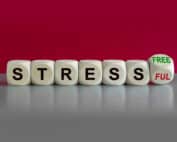Train Your Brain to Sleep Soundly. We are all creatures of habit and can learn, unlearn or relearn anything if we put our minds to it. While all of us have periods of disruption in our lives get off track. The good news is that we can get back on track.
Sleep is vital to our physical and mental health and for many people with all of the major changes going on locally, nationally and globally, sleep has been affected. The online world is 24/7 and work upheaval, sitting in front of a computer, exposre to blue light, exposure to infection or isolation has taken its toll.
First and foremost, it is recommended that you see a doctor to rule out any condtions that might be interfering with sleep such as hypoglycemia, thyroid disorders, sleep apnea, restless legs and other disorders. Once you are sure it is not any of the conditions that interfere with sleep, you can train your brain to sleep.
Behavioral Hacks for sleep
- Sleep is a learned behavior. Anything can be learned, unlearned and re learned. The brain is designed to pay attention to things that are close to each other. Pavlov’s dogs reacted to the bell, they would be fed and would salivate at the thought of food once they were trained to associate the bell with food. Even when no food was forthcoming, the bell still triggered salivation. If you have a routine and do the same things in succession before going to bed your brain will associate that routine with the fact that it is time to go to sleep.
- Prepare your mind and body to sleep once you are in bed. Close your eyes and do a guided meditation. Choose a positive, relaxing image and include all your senses with the image. For example, if you chose an ocean image, hear the waves, feel the sun on your skin, smell the salt air and taste the salt on your tongue, look at the water, sky and land and feel the ground or sand under you. While visualizing, do deep belly breathing. Keep a slow equal pace. This lets your brain know you are relaxed and calm. Slowing your breathing will slow down your heart rate and brain waves. Don’t wait until you can’t go to sleep to do this. Do the imagery as soon as you get in bed to train your brain. Practice during the day so you get good at it. You can use binaural beats at 1-4 hertz.
- Go to bed and wake up at the same time every day regardless of whether it is a weekend. It is a myth to think you can “catch up on sleep.” Do not nap. Napping can become a habit. Many cognitive behavioral programs recognize that you can fall into a trap with naps. Unless you are recovering from an illness, your brain will get used to napping and you will not fall asleep or stay asleep when you should.
- What you do during the day, what you eat, and drink will affect sleep such as tobacco or alcohol, or caffeine. Alcohol is tricky, it will make you fall asleep but will wake you up in the middle of the night. As the levels of alcohol drop, it becomes a stimulant and can wake you up with dry mouth, sweats and/or palpitation. Both alcohol and caffeine are dehydrating so stay hydrated with good old fashioned water. Some people are slow metabolizers of caffeine so do not have caffeine after 1PM or it may keep you awake.
- Eat light at night. Do not have a heavy meal and go to sleep. Digest your dinner hours in advance to have better sleep. You want to have your meal fully digested before laying down to avoid reflux and any discomfort due to the digestive process. During sleep your body needs to repair, rejuvenate, release certain hormones and get into deep wave sleep to clean your brain. This won’t happen if you are still digesting.
- Exercise early and if you are going to exercise, do gently yoga or tai chi. Don’t get your heart rate revved up since it will make it harder to slow down and unwind.
- Associate your bed with only sleep and sex, no working in bed or eating in bed. Your brain will not recognize your bed as a place to sleep if you are working on your computer or tablet or eating in bed.
- Do not watch or read anything that gets excited or raises your heartrate. Prime your brain for sleep, watch or read something relaxing. If you become upset or excited, sleep may be difficult.
- Do not make it a habit to work on your to do list in the middle of the night. You will always have things to do and things on your mind and will develop a habit. Instead, write things down and set an intention to do them at a specific time. It will send a signal to your brain that it OK to go to sleep and stay asleep because you set an intention and wrote down what you are going to do and when.
Address Your Physiological Needs
- Go to the bathroom before bedtime
- Have a glass of water next to you if you are thirsty
- Don’t go to bed hungry
Manage Your Environment
- Look for things that are irritating such as rough or scratchy fabrics or stimulating scents. Pay attention to the type of laundry detergent or fabric softeners, candles or air fresheners you use. Certain scents like lavender are calming whereas mint and rosemary can be stimulating. Fragrances are chemical unless they are essential oils and chemicals may have unwanted effects so avoid fragrant things in your bedroom unless they are essential oils known to be calming and induce sleep.
- Dampen noise with earplugs or white noise machine if necessary.
- Block light. Invest in blackout shades or use an eye mask.
- Keep Cool. Make sure the room is cooler at night because our bodies warm up at night and this can disrupt sleep.
- Use a humidifier if you are in a dry environment
- Keep your phone out of the bedroom. Some people text in the middle of the night and your mind will be on constant alert. You will be too tempted to use it or answer it and it will be more of a distraction.
These simple strategies can have a profound effect, however for some that is not the full picture. Get an evaluation by a functional medicine physician and get more detailed information, evaluations, strategies, resources, and supplements for sleep at a discount in the Sleep Soundly Care 4 U Course. Pleasant Dreams






She is a recognized and award-winning holistic, functional, integrative and anti-aging healthcare practitioner, speaker and author, and has been featured in ABC News, Forbes, WOR Radio and many media outlets to spread the word that you can live younger and healthier at any age.